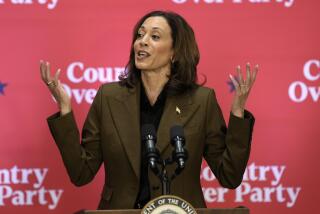A gay president?
- Share via
Even many Americans sympathetic to gay rights will be startled by a new Zogby International poll indicating that more than 60% of registered voters would support a qualified gay candidate for the presidency. Romantic as it may be, the notion that anyone can grow up to be president long has served as a metaphor for the openness and fairness of American society. It is thus remarkable, and reassuring, that nearly two-thirds of respondents in the poll expressed a willingness to discard one of the oldest and most pervasive prejudices when they enter the voting booth.
Zogby’s findings don’t come entirely out of the blue. Last year, a Gallup poll asked respondents whether they would vote for a presidential candidate who was gay. Fifty-five percent answered yes (compared with only 45% who would support an atheist candidate).
Critics of such polls will argue that they reflect a homophobic version of the Bradley Effect -- named for former Los Angeles Mayor Tom Bradley -- in which racist voters lie about their willingness to vote for a black candidate. But even if some respondents say they will vote for a gay candidate for fear of seeming politically incorrect, that is itself a comment on how far gays and lesbians have come.
Polls about the acceptability of a gay presidential candidate reflect a larger trend in support for gay equality. In a Field poll conducted shortly after the California Supreme Court’s same-sex marriage ruling in May, 51% of registered California voters favored allowing gay and lesbian couples to marry. Another Field poll released last month found that by a 51%-to-42% margin, California voters opposed Proposition 8, which would amend the state Constitution to overturn the high court’s decision.
With same-sex marriage, as with gay rights generally, the younger generation is leading the way. Last month’s Field poll found that opposition to Proposition 8 was greatest among voters under 30 years of age. That was consistent with a finding by the Pew Forum on Religion and Public Life that roughly half of adults under 30 supported same-sex marriage. The trend is clear: Support for gay rights and same-sex marriage is being driven by generational change.
But differences among age groups cannot completely explain the greater tolerance for gays and lesbians. Thanks to the gay-rights movement, Americans of all ages are likelier to have openly homosexual relatives, neighbors and co-workers. Those personal contacts make it harder for decent people to accept discrimination against gays and lesbians -- including at the ballot box.
More to Read
Get the L.A. Times Politics newsletter
Deeply reported insights into legislation, politics and policy from Sacramento, Washington and beyond. In your inbox twice per week.
You may occasionally receive promotional content from the Los Angeles Times.










